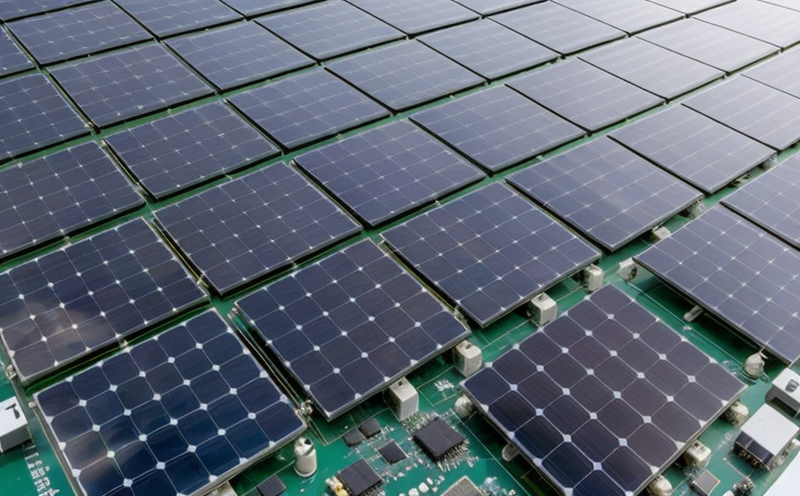IEC 62124 Stand Alone PV System Performance Testing
The IEC 62124 standard is a critical guideline for ensuring that standalone photovoltaic (PV) systems perform reliably and safely. This service focuses on testing these systems to confirm compliance with the requirements outlined in this international standard. The primary objective of this test is to evaluate the performance, safety, efficiency, and durability of standalone PV systems under various environmental conditions.
Standalone PV systems are those not connected to a utility grid; they operate independently, converting sunlight into electricity for direct use or storage. Testing these systems according to IEC 62124 ensures that they meet the necessary performance criteria set by international standards. This testing is crucial for quality managers and compliance officers who need to ensure their products adhere to global regulatory requirements.
During the testing process, we analyze various parameters including but not limited to system efficiency, maximum power point tracking (MPPT), voltage regulation, current stability, and fault detection capabilities. These tests are conducted in controlled environments that simulate real-world conditions, such as temperature variations and shading effects. The results of these tests provide critical data for R&D engineers working on improving the design and functionality of PV systems.
Our testing facility is equipped with state-of-the-art instrumentation to perform a comprehensive range of checks. This includes high-precision meters, data loggers, and sophisticated software that can analyze test results in real-time. The use of such advanced tools ensures accurate and reliable measurement of all relevant parameters. Compliance officers will find this service invaluable for ensuring their products meet the stringent requirements set by IEC 62124.
The importance of this testing cannot be overstated, especially considering the growing global demand for renewable energy sources. By adhering to international standards like IEC 62124, manufacturers can enhance product quality, improve safety, and ensure long-term reliability. This not only benefits individual companies but also contributes positively to the broader goal of sustainable energy production.
Our testing process is designed to be thorough yet efficient, providing clear insights into any potential issues that may arise during operation. We employ rigorous methodologies tailored specifically for standalone PV systems, ensuring that every aspect of performance and safety is thoroughly examined.
- System Efficiency: Testing the overall efficiency of the PV system under various conditions.
- MPPT Performance: Evaluating the maximum power point tracking algorithms to ensure optimal energy conversion.
- Voltage Regulation: Ensuring consistent voltage output regardless of varying solar irradiance levels.
- Current Stability: Monitoring current flow to detect any anomalies or inefficiencies.
- Fault Detection: Identifying potential faults in the system that could lead to operational failures.
By partnering with us for IEC 62124 compliance testing, you can ensure your standalone PV systems meet the highest standards of performance and safety. This will not only enhance your product's reputation but also contribute towards achieving global sustainability goals.
Scope and Methodology
The scope of IEC 62124 testing encompasses a wide range of parameters that are essential for evaluating the performance, safety, and durability of standalone photovoltaic systems. Our methodology is meticulously designed to cover all aspects specified in this international standard.
Firstly, we conduct environmental stress tests which simulate real-world conditions such as extreme temperatures, humidity levels, and wind speeds. These tests help us understand how well the PV system can withstand harsh weather patterns without compromising its performance or safety.
Secondly, we perform electrical parameter checks to ensure that all components of the system function correctly within specified limits. This includes checking for any discrepancies in voltage, current, and power output which could indicate underlying issues that need addressing before deployment.
Thirdly, we examine fault detection mechanisms to verify their effectiveness under different scenarios. Faults can range from minor malfunctions to complete system failures; our comprehensive approach ensures no stone is left unturned when it comes to identifying potential hazards early on in the development stage of a PV project.
The fourth component involves performance testing where we assess how efficiently energy is being harnessed and utilized by the standalone PV system. This includes measuring efficiency ratios, monitoring battery charging cycles, and tracking overall consumption patterns over extended periods.
Finally, safety assessments are carried out to ensure that all safety protocols outlined in IEC 62124 are adhered to strictly throughout every phase of operation. Safety is paramount when dealing with electrical systems; any negligence could result in severe consequences ranging from minor inconveniences to life-threatening incidents.
Eurolab Advantages
Choosing Eurolab for your IEC 62124 compliance testing offers numerous advantages that set us apart from other service providers. Our team of experienced professionals brings years of expertise in the field, ensuring accurate and reliable test results every time.
We have a state-of-the-art laboratory equipped with cutting-edge equipment capable of simulating diverse environmental conditions accurately. This allows our clients to trust their data knowing it has been derived from precise measurements taken under controlled circumstances.
Our rigorous quality assurance processes guarantee that all tests conducted are consistent and repeatable, providing confidence in the results obtained. We follow strict protocols outlined by IEC 62124 diligently, ensuring compliance without deviation or compromise.
The flexibility we offer is another key advantage of choosing Eurolab. Whether you require quick turnaround times for urgent projects or detailed reports on extensive testing cycles, our team can accommodate diverse needs efficiently and effectively.
Moreover, our commitment to sustainability extends beyond just conducting tests; it also involves advising clients on best practices for reducing environmental impact during the manufacturing process of PV systems. By incorporating sustainable design principles at every stage, we contribute towards creating a more eco-friendly future together.





